|
|
|
Sort Order |
|
|
|
Items / Page
|
|
|
|
|
|
|
| Srl | Item |
| 1 |
ID:
170881
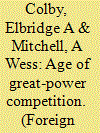

|
|
|
| 2 |
ID:
158779
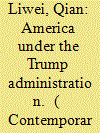

|
|
|
| 3 |
ID:
150973
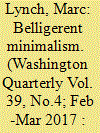

|
|
|
|
|
| Summary/Abstract |
Donald J. Trump's election as the next President of the United States has thrown enormous doubt upon the continuity of American policy around the world. For the Middle East, Trump did not articulate a coherent policy during the campaign, but he has generally been highly critical of the Obama administration's management of the region. Trump's campaign sharply criticized the nuclear agreement with Iran, opposed intervention on behalf of rebels in Syria, criticized allies such as Saudi Arabia, and called for a ban on Muslim immigration to the United States.
|
|
|
|
|
|
|
|
|
|
|
|
|
|
|
|
| 4 |
ID:
168047
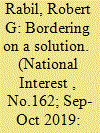

|
|
|
|
|
| Summary/Abstract |
AS THE Trump administration presses Arab countries to sign off on President Donald Trump’s Israeli-Palestinian “deal of the century” amid growing Arab polarization and vocal pessimism, little attention has been given to another sensitive regional matter that the administration has been aptly and quietly tackling. This matter revolves around the demarcation of the Lebanon-Israel maritime and land borders, which have been the focal point of skirmishes, a devastating war in 2006, and rising regional tension involving Iran and Israel.
|
|
|
|
|
|
|
|
|
|
|
|
|
|
|
|
| 5 |
ID:
170868
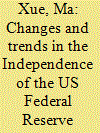

|
|
|
| 6 |
ID:
172121
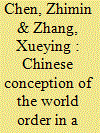

|
|
|
|
|
| Summary/Abstract |
The arrival of the Trump administration in the United States has sent shockwaves through the global system, triggering widespread rethinking of the current world order and its future direction. This happens at a time when China is starting to embrace a more proactive role in shaping the world order, based on its growing national strength and global influence. During the last seven decades, China has transformed itself from a ‘revolutionary order-challenger’ to a ‘reformist order-shaper’. In the post-Cold War hybrid world order, China has gradually developed its view regarding the positive components of the world order which should be maintained, the deficient aspects of the world order to be reformed, and a vision of shared future to be promoted. Facing the challenge of the Trump era, Chinese scholars are debating future scenarios for the world order and how China could position itself and contribute to a more resilient international system. Though worst-case scenarios are considered, cautious optimism is maintained.
|
|
|
|
|
|
|
|
|
|
|
|
|
|
|
|
| 7 |
ID:
161760


|
|
|
|
|
| Summary/Abstract |
This article outlines the principles of a new conservative internationalism for the Trump era, and discusses how well the administration’s actions and words fit this paradigm. In order for Republicans and conservatives to reclaim their reputation as the party of strong national defense and competent foreign policy, current and future policymakers need to blend some traditional principles of conservative internationalist foreign policy with new adaptations required by challenging international security developments on the one hand, and changes in the domestic political views of right-leaning American voters on the other. A year into the Trump administration, there are some signs that the administration is indeed attempting to adjust slightly rather than replace the traditional principles of conservative Republican foreign policy, and therefore the “America First” grand strategy framework might become much more traditional in its actual policy decisions than in some of its rhetoric.
|
|
|
|
|
|
|
|
|
|
|
|
|
|
|
|
| 8 |
ID:
165904


|
|
|
|
|
| Summary/Abstract |
Since entering office, US president Trump has reversed key multilateral achievements of his predecessors, initiating a new US retreat from multilateral cooperation. For other governments wishing to preserve and deepen existing global agreements, this has posed the question of whether and how multilateral cooperation can work without the leadership and support of the dominant global power. International relations scholars have already debated the possibility of “nonhegemonic cooperation” in earlier periods marked by US unilateralism. This article draws on these previous analyses to evaluate the current prospects and limits of a “multilateralism minus one” in three key global policy areas: nuclear arms control, climate change, and trade.
|
|
|
|
|
|
|
|
|
|
|
|
|
|
|
|
| 9 |
ID:
167738
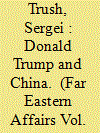

|
|
|
|
|
| Summary/Abstract |
China and questions about U.S.-PRC relations are now a topic that runs through the Trump administration, in terms of both domestic and foreign policies. In the 2017 U.S. National Security Strategy, Washington specified China as America's "main competitor" for the first time. In China's opinion, it has the right within the confines of a "trade war" to take such measures as protecting its domestic market and national economy, which do not contradict the norms of the World Trade Organization (WTO). China is still not ready to do what the United States did, i.e., capitalize its economic resources and structure, bring branches of the economy into the world division of labor, or create value chains while dominating them as widely and thoroughly as the Americans have. Elements of "trilateralism" are growing in relations between Russia, China, and the United States.
|
|
|
|
|
|
|
|
|
|
|
|
|
|
|
|
| 10 |
ID:
152920


|
|
|
| 11 |
ID:
171199
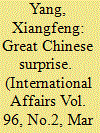

|
|
|
|
|
| Summary/Abstract |
Ample evidence exists that China was caught off guard by the Trump administration's onslaught of punishing acts—the trade war being a prime, but far from the only, example. This article, in addition to contextualizing their earlier optimism about the relations with the United States under President Trump, examines why Chinese leaders and analysts were surprised by the turn of events. It argues that three main factors contributed to the lapse of judgment. First, Chinese officials and analysts grossly misunderstood Donald Trump the individual. By overemphasizing his pragmatism while downplaying his unpredictability, they ended up underprepared for the policies he unleashed. Second, some ingrained Chinese beliefs, manifested in the analogies of the pendulum swing and the ‘bickering couple’, as well as the narrative of the ‘ballast’, lulled officials and scholars into undue optimism about the stability of the broader relationship. Third, analytical and methodological problems as well as political considerations prevented them from fully grasping the strategic shift against China in the US.
|
|
|
|
|
|
|
|
|
|
|
|
|
|
|
|
| 12 |
ID:
167304


|
|
|
|
|
| Summary/Abstract |
As the Trump administration signals a return to great-power competition, it has also damaged the United States’ ability to prevail.
|
|
|
|
|
|
|
|
|
|
|
|
|
|
|
|
| 13 |
ID:
155388
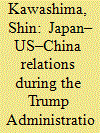

|
|
|
|
|
| Summary/Abstract |
Recent political events, such as the UK decision to exit the EU and the election of Donald Trump to the US presidency, may indicate a transition from globalism to isolationism in world politics. This article reviews Japan-US-China relations and East Asian regional cooperation during the Obama administration and contrasts them with prospects during the Trump administration in the new political climate.
|
|
|
|
|
|
|
|
|
|
|
|
|
|
|
|
| 14 |
ID:
166160
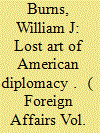

|
|
|
| 15 |
ID:
152152
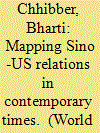

|
|
|
|
|
| Summary/Abstract |
Sino-American perceptions of global order vary drastically and they do not share many security interests or political values. Present distrust between the U.S. and China is based on conflicting strategic, economic, and ideological perspectives. America’s denouncement of one-China policy under President Trump seems to be a strategy to manage increasingly assertive China. It is widely believed in America that with the rise in China’s economic and military power it is becoming more expansionary and intend to be a threat to freedom of navigation in the South China and East China seas, as well as a threat to the security of the U.S. allies in the region—primarily Japan, South Korea and Australia.
|
|
|
|
|
|
|
|
|
|
|
|
|
|
|
|
| 16 |
ID:
189441
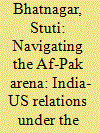

|
|
|
|
|
| Summary/Abstract |
The gradual elevation of India-US relations over the past few decades highlights a significant convergence of interests, a similarity in dominant political discourse and a converging geopolitical environment that has aided this elevation. This article explores engagements between India and the US within the Af-Pak arena, reflected in policy discourse and public pronouncements in both countries. It does so through a critical discourse analysis and examination of personal, national interest, and broader structural calculations that have driven Indian and American policy engagement reflected in their policy positions with regards to Afghanistan and Pakistan.
|
|
|
|
|
|
|
|
|
|
|
|
|
|
|
|
| 17 |
ID:
174259


|
|
|
|
|
| Summary/Abstract |
Fatah leaders routinely accuse Hamas of plotting to establish an “emirate” in the Gaza Strip. Gaza is in fact turning into a statelet separate from the West Bank, but it is Israeli policies that are driving the “Gaza is Palestine” option with a series of measures that have been implemented since the early 1990s to sever Gaza from the West Bank. This development has intensified under the administration of U.S. president Donald Trump. In the White House's vision for Middle East peace, which turns the West Bank into a series of isolated Bantustans enveloped by Israeli territory and shorn of Jerusalem, the Gaza Strip becomes the centerpiece of any future Palestinian entity. The international community, laser focused on avoiding another war in Gaza, has prioritized the humanitarian over the political crisis, furthering the excision of the Palestinian territory. As aid flows directly into Gaza, bypassing Ramallah, and Israel and Hamas negotiate a long-term ceasefire, the Palestinian Authority (PA) finds itself increasingly marginalized.
|
|
|
|
|
|
|
|
|
|
|
|
|
|
|
|
| 18 |
ID:
163583


|
|
|
|
|
| Summary/Abstract |
In his recent article Saving Samuel Huntington and the Need for Pragmatic Civil–Military Relations, Travis proposes a model of civil–military relations based on “pragmatic civilian control.” This model has three main shortcomings. First, it does not adequately answer the question of “professional supremacy” versus “civilian supremacy” in making crucial decisions during wartime. Second, the distinctions between “wars of choice” and “wars of necessity,” and about the “kind of war” being fought, key theoretical variables mentioned by the author, are hard to judge objectively. And third, the new model would likely exacerbate rather than diminish the problem of military leaders getting involved in political and even partisan controversies; this is particularly problematic, given the unusual situation of many military leaders in the Trump administration occupying civilian positions of authority. If it is to be of practical use to policy makers, future scholarship on pragmatism and civil–military relations must address these weaknesses.
|
|
|
|
|
|
|
|
|
|
|
|
|
|
|
|
| 19 |
ID:
177995
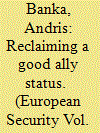

|
|
|
|
|
| Summary/Abstract |
What are the coping strategies of small states at a time when their great power ally questions its security guarantees? Faced with such a scenario, one strand of the literature proposes that small states will seek to establish a reputation of a “good ally” in the eyes of their security patron, thus reducing the likelihood of abandonment. Others, however, maintain that in times of heightened geopolitical uncertainty, small states will attempt to “hedge their bets” by reducing their reliance upon a capricious great power and pursue strategic realignment. The article tests these theoretical assumptions against NATO’s easternmost members: Estonia, Latvia, and Lithuania and their navigation of the “America First” world. The analysis lends evidence that the Baltics have not sought a strategic reorientation away from Washington. Instead, to guard against the possibility of their patron’s defection, they have strived to gain a loyal and trustworthy partner’s reputation by increasing their defence spending and joining the US on a foreign battlefield. The study concludes that these efforts have been primarily geared towards an audience of one: a NATO-sceptic US President.
|
|
|
|
|
|
|
|
|
|
|
|
|
|
|
|
| 20 |
ID:
158522
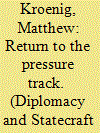

|
|
|
|
|
| Summary/Abstract |
During the 2016 United States presidential election campaign, Donald Trump promised to “renegotiate” the July 2015 Joint Comprehensive Plan of Action, better known as the Iran nuclear deal. The deal does not prevent Iran from building nuclear weapons and in some ways actually makes it easier for Iran to go nuclear in the future. The mere continuation of the current deal could undermine America’s interests in the Middle East and its global non-proliferation policy. How then can the Donald Trump Administration work to renegotiate the deal? This analysis provides a strategy that the Trump Administration can follow to improve American policy toward Iran, namely do what Iran is doing to the United States: abide by the strict terms of the agreement, whilst competing in all of the ways not covered in the deal. From an American perspective, increasing pressure on Tehran will constrain Iran’s destabilising influence in the region. Over time, Washington can leverage the pressure to force Iran back to the table to strike a renegotiated agreement that eliminates, not just delays, the Iranian nuclear and missile threat.
|
|
|
|
|
|
|
|
|
|
|
|
|
|
|
|
|
|
|
|
|